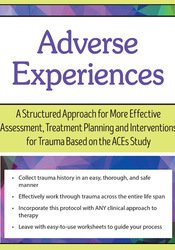

I once worked with a client who was diagnosed with panic disorder after experiencing a horrific car accident. Utilizing traditional talk therapy over the course of nine months, it became clear that her symptoms were not improving; in fact, they were getting worse.
She was no longer working, avoided driving or riding in cars, had gained weight, developed chronic pain and suffered from insomnia – all while in treatment where she was supposed to be getting better! I was at a loss as to where to go with therapy.
Then (at last!) there was a breakthrough! It didn’t happen by accident – I had discovered a new approach for assessment based on the Adverse Childhood Experiences (ACEs) study and implemented it with this client. Together we uncovered a long history of traumatic experiences that were the foundation of her symptoms – not only the car accident.
Based on this, we charted a very specific course of treatment and, within just 8 sessions, her symptoms had dramatically improved. She was back to work, driving with minimal distress, was panic-free, sleeping adequately and had begun exercising! Success!
Watch this highly experiential training to learn this strengths-based approach that is grounded in multiple empirically-based disciplines, including EMDR, CBT, MBSR and positive psychology.
Integrate this approach to more effectively treat:
You don’t want to miss out!
~Daniel Mitchell, Ph.D.
This online program is worth 5.75 hours CPD.
| File type | File name | Number of pages | |
|---|---|---|---|
| Manual (1.90 MB) | 50 Pages | Available after Purchase |
| 5 |
|
| 4 |
|
| 3 |
|
| 2 |
|
| 1 |
|
Satisfaction Guarantee
Your satisfaction is our goal and our guarantee. Concerns should be addressed to info@pesi.co.uk or call 01235847393.
Please wait ...